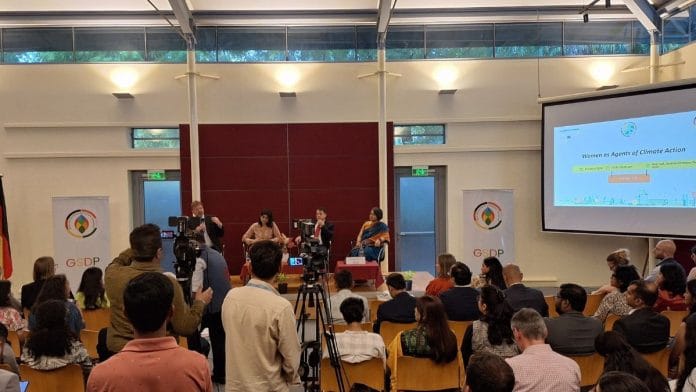New Delhi: If India wants to become a $5 trillion economy, it cannot afford to ignore women. By not including women in the climate dialogue, the country is potentially losing out on 40 per cent of its GDP. The audience nodded as Ambika Vishwanath, author and director of women-led consultancy firm Kubernein Initiative, called out governments and business heads for excluding women while tackling the most urgent problem in the world: Climate change.
A panel discussion, ‘Women as Agents of Climate Action’, held earlier this month at the German Embassy was a plea and a battle cry — to engage more women in government, boardrooms and at the grassroots level as well. The lack of diversity in current resilience programmes is telling, even though during extreme weather events, it’s women and girls who are most vulnerable to displacement, poverty and violence, according to a UN Environment report.
“Even though 80 per cent of those displaced by floods, earthquakes, cyclones, heatwaves, and other climate-related events are women, they are still largely absent from the spaces where these issues are addressed,” said Philipp Ackermann, Ambassador of Germany to India and Bhutan, who moderated the discussion.
“The energy sector across the globe, which is a major contributor to climate change, employs only 22 per cent of women in roles focused on finding solutions—and the numbers are much lower for India,” said Ackermann.
In the hour-long session, panellists touched upon a range of issues from the role of the corporate sector and the need to upskill India’s youth, especially young women, so that they are not just employable but in demand. But everyone acknowledged that women are still glaringly absent from boardrooms to grassroots solution-finding teams.
“If this trend continues, India may struggle to achieve its goal of becoming a $5 trillion economy within the next three years,” warned Vishwanath.
Recruitment to retention
Most decision-making bodies are male-driven. Vishwanath puts it down to the system of patriarchy that’s entrenched in Indian society. It’s what hinders women’s involvement in climate change action, she argued.
Assumptions that women aren’t educated or capable enough often stop male decision-makers from even considering women’s input on climate solutions. This system needs to change if we want real change.
“If we could overcome this social barrier, we would realise that women often have quicker and more cost-effective solutions to tackle the climate crisis,” said Vishwanath.
Personal biases have a role to play even in the hiring process. It poses a significant hurdle to improving the gender ratios within the company.
“The patriarchal mindset of the selection [recruitment] committee still favours hiring male candidates over female ones,” said CEO of Siemens Energy India, Guilhereme Mendonca, who was one of the panel members along with Sagarika Bose who heads CSR at software development company SAP in Mumbai.
When the moderater asked Mendonca about the highest-ranking female official in his company, he struggled to recall a name and shared that women face disruptions in careers due to maternity breaks with leaving and coming back becoming an issue.
“Siemens Energy India currently has only 13 per cent women in leadership roles on its payrolls, short of its target of achieving 25 per cent female leaders in its workforce by next year, which we are not going to do,” said Mendonca.
Being aware of these challenges he was determined to address the issue and shared some of the steps the company is taking to promote women in leadership roles. This included policies to prevent losing female employees after maternity breaks or when they need to care for family members.
“The company is trying to address the issue of gender bias by creating stricter non-discriminatory policies applicable to recruitment as well as retaining the female employees,” Mendoca added.
Also read: More Indian women are joining workforce but gender employment gap is still high, shows new report
Women driving change
The conversation quickly moved on to the need for governments — at the state and Centre—to actively seek out and support female-led startups focused on climate solutions, especially those that involve women and girls.
“Climate mitigation and adaptation strategies need tailored solutions, and for that, women must be involved at all levels within organisations,” said Vishwanath.
She pointed to the successful efforts of women from the local community in Sindhudurg, Maharashtra, who worked with the state government to prevent extensive flooding along Mandavi Creek in Vengurla. By collaborating with the United Nations Development Programme (UNDP), they played a key role in restoring the region’s mangrove forests.
Since the initiative began in 2017, the incidence of flooding has significantly decreased. Other states like Odisha and Andhra Pradesh, too, support similar initiatives. These gender-focused projects not only target restoration efforts but also include awareness programmes that equip and empower women.
At this point, a social entrepreneur in the audience stood up to talk about her experience in the field over the last 10 years. She didn’t hold back and said, “There is a big problem in the Indian Women Entrepreneurship ecosystem, where a lot of women are fronting for men. Even Niti Aayog which is our country’s leading policy think tank came up with the Women Entrepreneurship Platform and you will be shocked to see that 50,000 entrepreneurs registered are men.”
(Edited by Ratan Priya)






